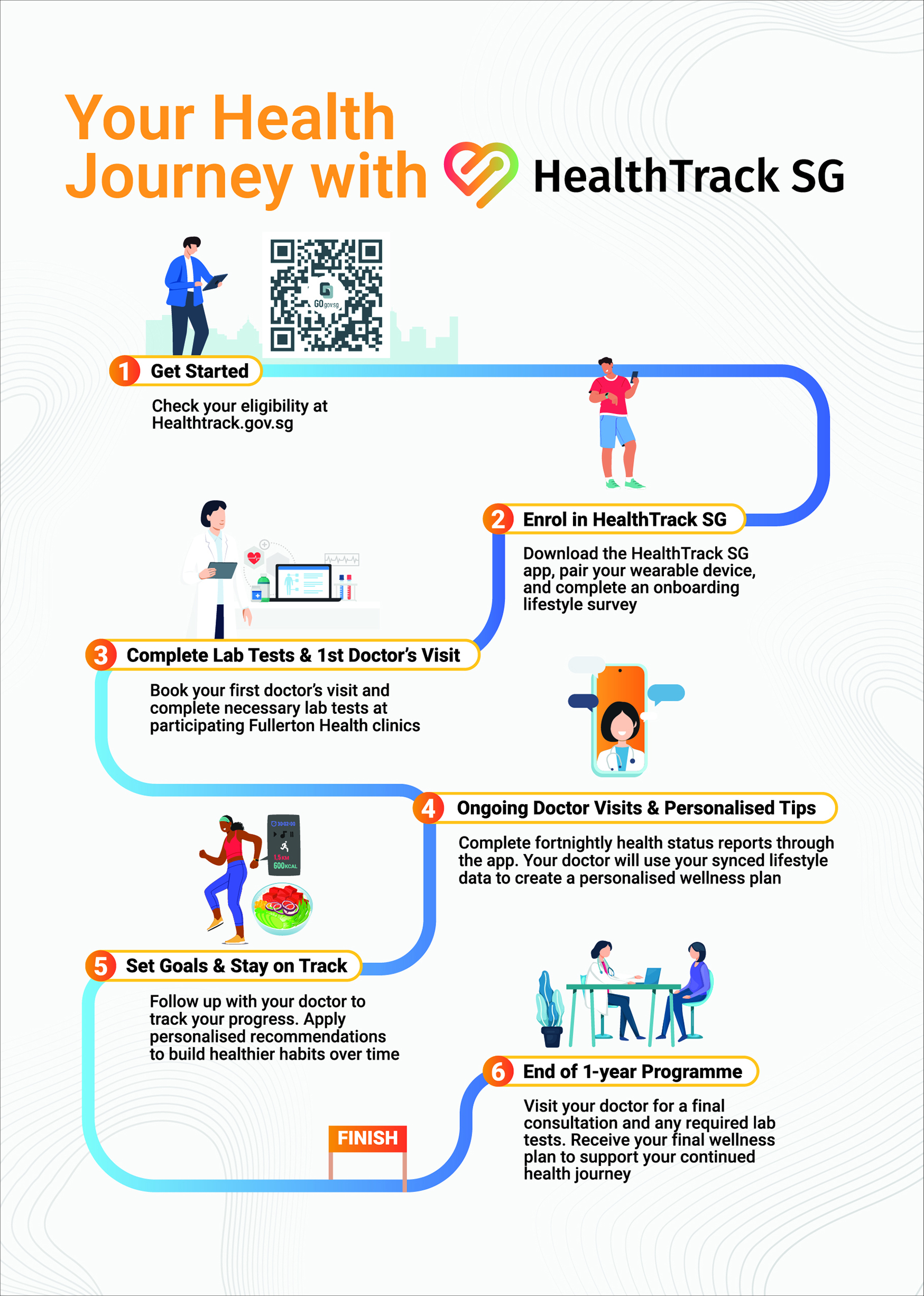
Chronic diseases like diabetes, high blood pressure, and high cholesterol are no longer limited to older adults. In Singapore, these conditions increasingly affect working-age individuals — and the numbers are rising fast.
Over 400,000 Singaporeans currently live with diabetes, a figure expected to hit one million by 20501. At the same time, hypertension is on the rise, with over one in three Singaporeans aged 18 to 74 experiencing persistent high blood pressure2. These figures likely underestimate the full picture, as many cases remain undiagnosed until complications emerge.
While Singapore’s healthcare system offers excellent clinical care, managing chronic conditions goes beyond occasional doctor visits. It requires daily awareness, consistent habits, and sustained support that fits into everyday life.

When Care Fails: The Gap Between the Clinic and Real Life
Singapore’s hospitals and clinics are world-class3, with an acute care system that is highly efficient. But chronic conditions are different. They don’t pause between doctor visits, and managing them requires more than occasional check-ins.
For people living with long-term illnesses, progress is shaped by daily routines: staying active, eating well, taking medications, and staying motivated.
“We’re rethinking the entire care journey,” says Dr Marcus Lee, Medical Director at Fullerton Health. “It’s no longer just about what happens in the doctor’s office; it’s about supporting patients every day, wherever they are.”
This gap between medical appointments and everyday life is known as the clinic-to-home care gap, and it’s one of the most overlooked risks in Singapore’s current healthcare model.
Without timely support, even the best medical advice can fall through the cracks, lost to stress, work, caregiving, or fatigue. It’s in this space that care often breaks down — and where lives can begin to unravel.

The Clinic-to-Home Care Gap: Where Patients Are Most at Risk
The traditional model of chronic care is episodic4. Once a patient leaves the clinic, they often face the hardest part of managing their condition on their own. Without tools or consistent feedback, even the most well-intentioned care plans can fall apart.
Patients may miss medications, fall into inconsistent eating habits or exercise routines, or fail to notice early symptoms that signal their condition is worsening. These gaps in daily management can lead to avoidable complications and hospital visits.
Dr Lee shares that most patients struggle in the in-between moments, when they’re on their own, trying to stay on track.
This is precisely where technology-enabled chronic care programmes can make a life-changing difference by offering ongoing support that bridges the gap between appointments and everyday life.

Beyond Prevention: Supporting Patients Already Living with Chronic Disease
Recognising the daily challenges of chronic disease management, Singapore is shifting toward a more connected model of care — one that supports patients beyond the clinic and into their everyday lives.
To bridge this gap, Singapore is embracing a new model of chronic care5 – one that uses digital tools like wearables and health tracking to support patients in their daily lives.
HealthTrack SG is a year-long pilot programme by the Health Promotion Board, in partnership with Google, ConnectedLife and Fullerton Health. It’s designed to complement clinical care with lifestyle support to help patients manage hypertension, Type-2 diabetes and Lipid disorders (including high cholesterol)
A Day in the Life with HealthTrack SG
Imagine someone like Alvin, 38, working full-time, recently diagnosed with pre-diabetes and high cholesterol. Between work and family, managing his health feels overwhelming.
With HealthTrack SG, that journey looks different.
Alvin starts tracking his activity, sleep, and heart rate with a wearable device. His doctor notices his activity drops on weekends and suggests small, achievable changes: short walks after lunch, simple stretches, and better sleep habits.
These consistent steps lead to a higher Wellness Score, improved blood sugar control — and most importantly, a renewed sense of confidence.
This is the kind of practical, personalised support HealthTrack SG is designed to provide — care that fits into real life.
Why Personalised Feedback Works
Unlike traditional materials like pamphlets or one-off health talks, HealthTrack SG offers a more dynamic, personalised experience. Patients receive real-time, relevant advice, whether it’s about activity, sleep, or stress, tailored to their daily routines.
These insights are paired with regular nudges and reminders to help build healthy habits, even when life gets busy. Whether commuting, working, or spending time with family, support is just a tap away.
While the wearable device tracks key health data in the background, a care coordinator monitors progress and provides timely support. It’s continuous care that fits seamlessly into everyday life.
“The combination of data and human support builds real trust,” says Dr Lee. “Patients aren’t just compliant – they’re committed.”
Empowered Patients, Healthier Nation
Chronic diseases aren’t going away. But how we manage them can and must change.
By shifting from episode treatment to everyday empowerment, Singapore can build a healthcare system that is not only more efficient but also more humane.
Your health journey doesn’t have to be solitary. With the right support, it can be informed, connected, and truly personal.
Learn more about HealthTrack SG.
References:
- Diabetes Risk: Embracing Facts to Pioneer New Approaches. Available at https://ipur.nus.edu.sg/impact-storie/diabetes-risk-embracing-facts-to-pioneer-new-approaches/?utm_source=chatgpt.com (Accessed: 4 June 2025)
- Singapore Heart Foundation. High Blood Pressure. Available at: https://www.myheart.org.sg/health/risk-factors/high-blood-pressure/#:~:text=According%20to%20the%20National%20Population,40.5%25)%20compared%20to%202020 (Accessed: 3 June 2025)
- Ankit Kankar (2025). Singapore’s Healthcare Blueprint: Efficiency, Innovation, and the Future of Medical Excellence. Available at: https://medtechspectrum.com/analysis/24/23979/singapores-healthcare-blueprint-efficiency-innovation-and-the-future-of-medical-excellence.html (Accessed: 30 May 2025)
- Chuan De Foo, Hui Xiang Chia, & Ken Wah Teo, Aysha Farwin, Jumana Hashim, Gerald Choon-Huat Koh et al. (2023). Healthier SG: Singapore’s multi-year strategy to transform primary healthcare. Available at: https://www.thelancet.com/journals/lanwpc/article/PIIS2666-6065(23)00179-7/fulltext#:~:text=While%20GPs%20in%20Singapore%20have,requirements%20and%20more%20complex%20drug (Accessed: 3 June 2025)
- Kai Ping Sze, Yean Lyi Lim, Qi Wei Fong, Jacqueline Giovanna de Roza, Poay Sian Sabrina Lee, Eng Sing Lee and Shu Yun Tan (2025). Digital health’s impact on the patient-doctor relationship in a primary healthcare setting: A qualitative study. Available at https://annals.edu.sg/digital-healths-impact-on-the-patient-doctor-relationship-in-a-primary-healthcare-setting-a-qualitative-study/ (Accessed: 5 June 2025)





